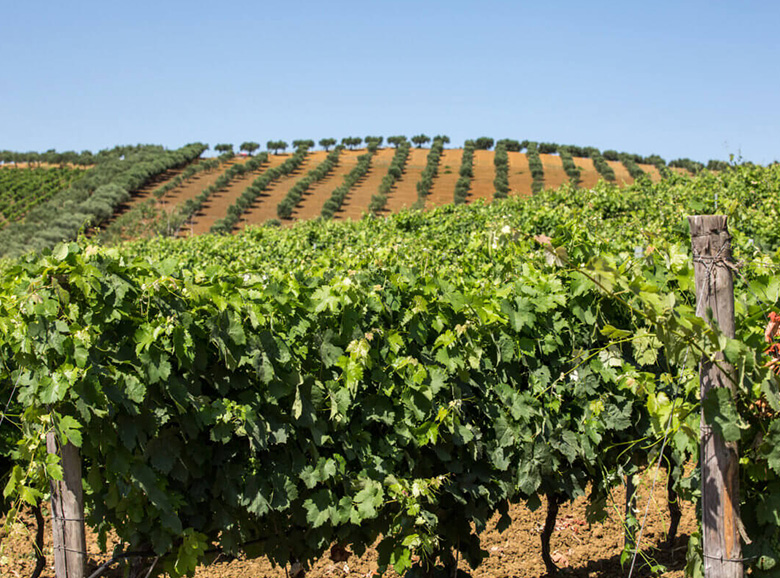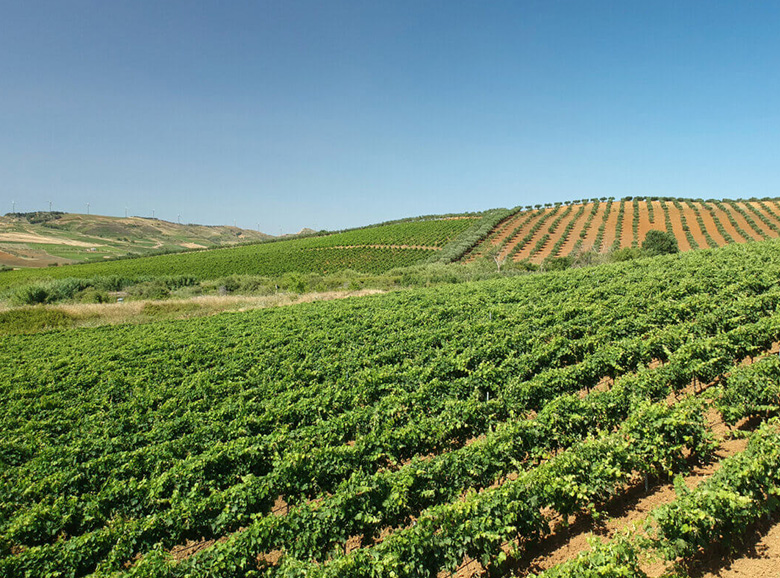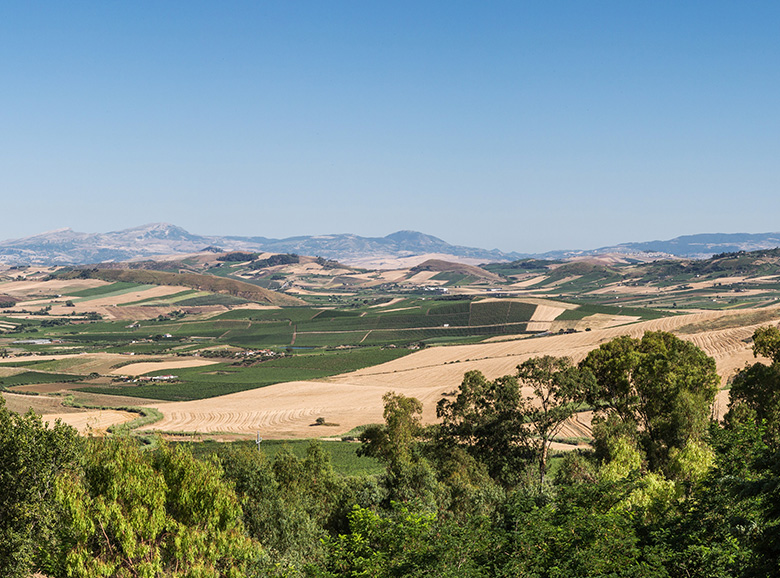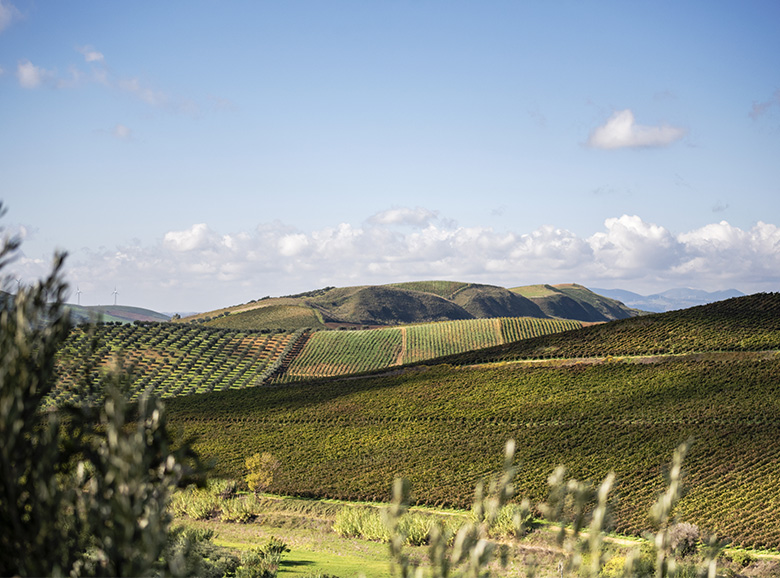THE TERRITORY
The Terroir
Respect for the land, knowledge and care for every single vine growing on the estate. An essential philosophy for the production of high-quality wines, each one a unique expression of the peculiar properties of its respective terroir: a viticultural and oenological vision centred on the ampelographic profile of the Monreale Doc area.

Feudo Disisa offers an extraordinary pedoclimatic environment for viticulture. Altitude, sun and wind exposure, soil composition, all combine in the making of a unique terroir, a wine estate which, historically, has always been regarded as one of the best in the entire countryside of Grisì and the Monreale area. Immersed in unspoilt nature, ours is a farm particularly suited to the production of tradition that, in addition to arable land (mainly wheat), has in the vine and olive trees its most important expressions. Alongside agriculture - in Feudo Disisa - we have always supported cattle breeding.
Agriculture and livestock, already at the end of the 19th century, were for our family the distinctive elements of a business activity open to modernity, thanks to choices that have enhanced the potential of a land rich in history but, technically, attentive to innovation and the continuous search for quality. We were among the first companies to introduce in Sicily the mechanical means for the processing of the land and in the management of crops; today Feudo Disisa is one of the leading reality of the DOC of Monreale, with wines that constitute the focal point of a viticultural and oenological vision centered on the ampelological heritage and the interactions that each vine has with the habitat that has welcomed it.

The Terroir
Respect for the land, knowledge and care for every single vine growing on the estate. An essential philosophy for the production of high-quality wines, each one a unique expression of the peculiar properties of its respective terroir: a viticultural and oenological vision centred on the ampelographic profile of the Monreale Doc area.

Feudo Disisa offers an extraordinary pedoclimatic environment for viticulture. Altitude, sun and wind exposure, soil composition, all combine in the making of a unique terroir, a wine estate which, historically, has always been regarded as one of the best in the entire countryside of Grisì and the Monreale area. Immersed in unspoilt nature, ours is a farm particularly suited to the production of tradition that, in addition to arable land (mainly wheat), has in the vine and olive trees its most important expressions. Alongside agriculture - in Feudo Disisa - we have always supported cattle breeding.

Agriculture and livestock, already at the end of the 19th century, were for our family the distinctive elements of a business activity open to modernity, thanks to choices that have enhanced the potential of a land rich in history but, technically, attentive to innovation and the continuous search for quality. We were among the first companies to introduce in Sicily the mechanical means for the processing of the land and in the management of crops; today Feudo Disisa is one of the leading reality of the DOC of Monreale, with wines that constitute the focal point of a viticultural and oenological vision centered on the ampelological heritage and the interactions that each vine has with the habitat that has welcomed it.

The DOC Of Monreale
Created in 2000, the Monreale DOC denomination includes red and white wines from an area in the south-west of Palermo: this corner of Sicily, in the heart of the Conca d'Oro, is the origin of the ancient and powerful Diocesi of Monreale which, in the Norman period, reached its maximum splendor.
The DOC Monreale is one of the largest denominations in the province of Palermo. It occupies a total geographical area which covers a large part of north-western Sicily, including part of the municipalities of Monreale and Piana degli Albanesi, as well as municipalities of Camporeale, San Giuseppe Jato, San Cipirello, Santa Cristina Gela, Corleone and Roccamena in their entirety. These boundaries still mostly reflect the geographical and socio-economic dimension of what was once the ancient and powerful Diocese of Monreale.
A traditionally rural area dedicated to the farming of vines, olive trees and wheat, its history has shaped the identity of the high Belice Corleonese area and its communities, expression of a peasant culture which has witnessed times of great historical and social significance: from the birth of the Sicilian Fasci to the struggle for agrarian reform, which led to the fight against latifundia and the power wielded by rich land owners. These historical events have empowered Sicilian peasants and gave rise to a new system, mostly composed of small and medium independent holdings. This agricultural landscape, centred around viticulture, is the life blood of the entire economic fabric of the Palermo area, creating countless opportunities for wine-tourism for the entire territory of the Monreale DOC.


The DOC Of Monreale
Created in 2000, the Monreale DOC denomination includes red and white wines from an area in the south-west of Palermo: this corner of Sicily, in the heart of the Conca d'Oro, is the origin of the ancient and powerful Diocesi of Monreale which, in the Norman period, reached its maximum splendor.
The DOC Monreale is one of the largest denominations in the province of Palermo. It occupies a total geographical area which covers a large part of north-western Sicily, including part of the municipalities of Monreale and Piana degli Albanesi, as well as municipalities of Camporeale, San Giuseppe Jato, San Cipirello, Santa Cristina Gela, Corleone and Roccamena in their entirety. These boundaries still mostly reflect the geographical and socio-economic dimension of what was once the ancient and powerful Diocese of Monreale.
A traditionally rural area dedicated to the farming of vines, olive trees and wheat, its history has shaped the identity of the high Belice Corleonese area and its communities, expression of a peasant culture which has witnessed times of great historical and social significance: from the birth of the Sicilian Fasci to the struggle for agrarian reform, which led to the fight against latifundia and the power wielded by rich land owners. These historical events have empowered Sicilian peasants and gave rise to a new system, mostly composed of small and medium independent holdings. This agricultural landscape, centred around viticulture, is the life blood of the entire economic fabric of the Palermo area, creating countless opportunities for wine-tourism for the entire territory of the Monreale DOC.


